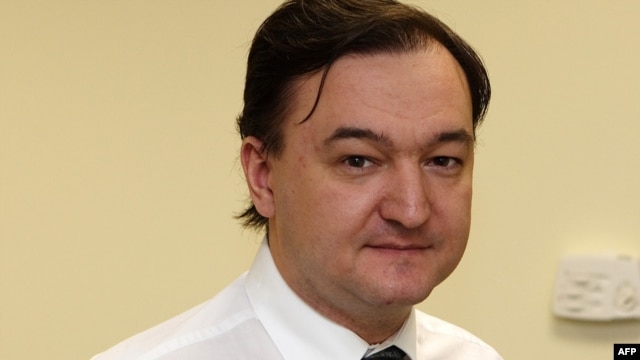Russia: Hearing postponed in posthumous trial of Magnitsky
| Publisher | Radio Free Europe/Radio Liberty |
| Publication Date | 28 January 2013 |
| Cite as | Radio Free Europe/Radio Liberty, Russia: Hearing postponed in posthumous trial of Magnitsky, 28 January 2013, available at: https://www.refworld.org/docid/5122359d1c.html [accessed 1 June 2023] |
| Disclaimer | This is not a UNHCR publication. UNHCR is not responsible for, nor does it necessarily endorse, its content. Any views expressed are solely those of the author or publisher and do not necessarily reflect those of UNHCR, the United Nations or its Member States. |
Last updated (GMT/UTC): 28.01.2013 18:41
By RFE/RL
 Russian lawyer Sergei Magnitsky died in custody in 2009.
Russian lawyer Sergei Magnitsky died in custody in 2009.
A preliminary hearing has been postponed in the posthumous trial of Sergei Magnitsky, the Russian lawyer who died in prison in 2009 after accusing government officials in a massive fraud scheme.
A Magnitsky family lawyer told the Interfax news agency that the family would not cooperate in the trial, which has now been set for February 18. The court announced it will appoint lawyers to defend Magnitsky.
Prosecutors filed new charges of tax evasion against Magnitsky last year. Charges have also been filed against William Browder, the owner of the Hermitage Capital investment fund where Magnitsky worked. Browder, who is outside Russia, is to be tried in absentia.
Supporters, NGOs, and the Kremlin's own human rights commission say the 37-year-old Magnitsky was denied proper medical care and abused during nearly a year in pre-trial detention. He was arrested after implicating mid-ranking Interior Ministry and tax officials in a $230 million scheme to defraud the government. His case has become an international symbol of Russia's human rights and rule-of-law failings.
According to Professor David M. Crane, who specializes in international criminal and humanitarian law at Syracuse University College of Law in the United States, the proceedings against Magnitsky are highly unusual.
"The trial of Sergei Magnitsky posthumously is a modern first," he says. "Rarely has [a posthumous prosecution] happened in history. It is a centuries-old concept that hasn't been done in over five centuries in some kind of meaningful manner."
Last week, Amnesty International's Europe and Central Asia Director John Dalhuisen said, "This posthumous prosecution is farcical, but unfortunately also deeply sinister." He called the trial of a deceased person a "dangerous precedent" that attempts to deflect attention from those who committed the crimes he exposed.
The U.S. Congress passed legislation in December imposing sanctions and travel restrictions on Russian officials connected to the death of Magnitsky and other perceived gross human rights violations in Russia.
The move provoked a furious response from Moscow, where lawmakers quickly voted to ban U.S. adoptions of Russian orphans in response.
In an interview on Russian television on December 26, Russian Prime Minister Dmitry Medvedev said no business people showed interest in the Magnitsky case during his visit to the World Economic Forum in Davos. He said it was only of interest to those who want to make "political capital" out of it.
With reporting by RFE/RL's Richard Solash, Reuters, and AFP
Link to original story on RFE/RL website
